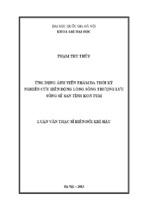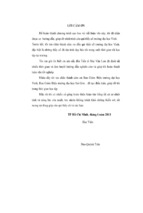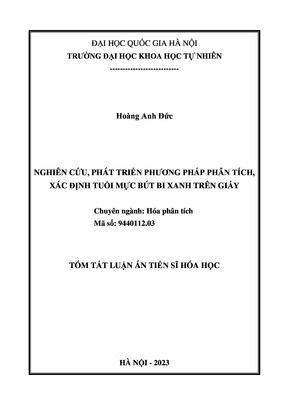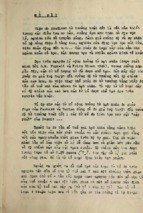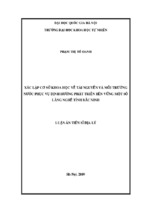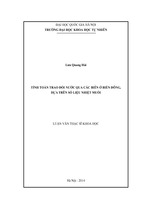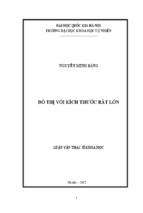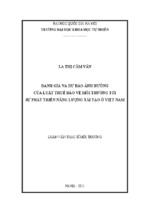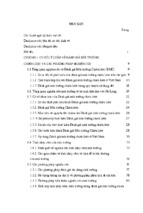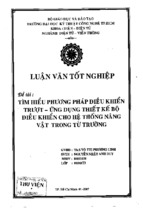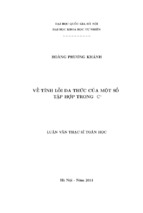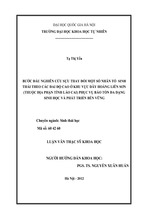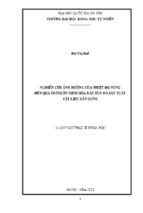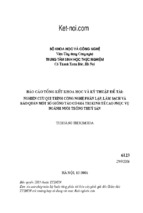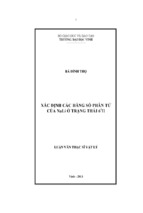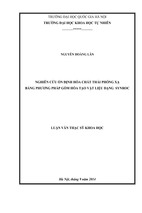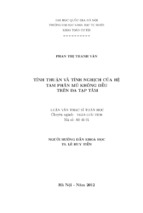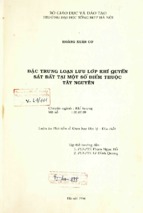BA RIA VUNG TAU UNIVERSITY
---------------
THESIS
READING SELF-EFFICACY AND ENGLISH
READING STRATEGY USE OF EFL STUDENTS AT
XUAN TRUONG HIGH SCHOOL
Student’s name: LE THI NHAT TRA
Student’s code: 18110093
Supervisor’s name: TRAN QUOC THAO, Ph.D.
BA RIA VUNG TAU, 2021
1
TABLE OF CONTENTS
CERTIFICATE OF ORIGINALITY ............................................................................ vii
RETENTION AND USE OF THE THESIS ................................................................viii
ACKNOWLEDGEMENTS ............................................................................................. ix
ABSTRACT ....................................................................................................................... x
APPENDICES ................................................................................................................... xi
LIST OF TABLES ........................................................................................................... xii
LIST OF FIGURES ........................................................................................................ xiii
LIST OF ABBREVIATIONS AND SYMBOLS .......................................................... xiv
CHAPTER 1: INTRODUCTION .................................................................................... 1
1.1. Background to the study ........................................................................................ 1
1.2. Statement of the problem ....................................................................................... 3
1.3. Aims and Objectives of the Study ......................................................................... 3
1.4 Research questions .................................................................................................. 4
1.5 Scope of the study .................................................................................................... 4
1.6 Significance of the study ......................................................................................... 4
1.7 Organization of the thesis ....................................................................................... 5
CHAPTER 2: LITERATURE REVIEW ........................................................................ 7
2.1. Definitions of the Terms ......................................................................................... 7
2.2. Reading self-efficacy ............................................................................................... 7
2.3. Reading strategies ................................................................................................. 11
2.3.1 Reading strategies in reading skills .............................................................. 11
2.3.2 Types of reading strategies ............................................................................ 12
2.4. Correlation between reading self-efficacy and reading strategies ................... 15
i
2.5. Previous studies..................................................................................................... 16
2.6. Conceptual framework ........................................................................................ 19
2.7. Summary ............................................................................................................... 20
CHAPTER 3: METHODOLOGY ................................................................................. 21
3.1. Research design..................................................................................................... 21
3.2. Research site .......................................................................................................... 22
3.3. Research participants ........................................................................................... 23
3.4. Research instruments ........................................................................................... 26
3.4.1 Questionnaire .................................................................................................. 26
3.4.2 Semi-structured interview ............................................................................. 27
3.5. Data collection procedures................................................................................... 28
3.6. Data analysis procedure ....................................................................................... 29
3.7 Summary ................................................................................................................ 30
CHAPTER 4: RESULTS AND DISCUSSIONS ........................................................... 31
4.1. Results .................................................................................................................... 31
4.1.1. The reading self-efficacy of EFL students at Xuan Truong high school .. 31
4.1.2. English reading strategies use of EFL students at Xuan Truong high
school......................................................................................................................... 43
4.1.3. Relationship between EFL students’ reading self-efficacy and English
reading strategy use of EFL students at Xuan Truong high school. .................. 54
4.2. Discussions ............................................................................................................. 56
4.2.1. The reading self-efficacy of EFL students at Xuan Truong high school .. 56
4.2.2. English reading strategies use of EFL students at Xuan Truong high
school......................................................................................................................... 58
4.2.3. Relationship between EFL students’ reading self-efficacy and English
reading strategy use ................................................................................................. 60
ii
4.3. Summary ............................................................................................................... 61
CHAPTER 5: CONCLUSION AND RECOMMENDATION .................................... 62
5.1. Summary of the main findings of the thesis ....................................................... 62
5.2. Implications ........................................................................................................... 63
For teachers .............................................................................................................. 63
For students .............................................................................................................. 64
For administrators................................................................................................... 65
5.3 Limitations ............................................................................................................. 66
REFERENCES ................................................................................................................ 68
Appendix A: QUESTIONNAIRE FOR STUDENTS................................................... 79
Appendix B: Questionnaire for Survey (Vietnamese translation) .............................. 84
Appendix C: Interview Protocol .................................................................................... 89
Appendix D: Interview Protocol (Vietnamese translation) ......................................... 90
Appendix E: Sample of interview data analysis ........................................................... 86
iii
The thesis entitled READING SELF-EFFICACY AND ENGLISH READING
STRATEGY USE OF EFL STUDENTS AT XUAN TRUONG HIGH SCHOOL
was successfully defended and approved on ………..…. at Ba Ria Vung Tau
University
Academic Supervisor: Dr. TRAN QUOC THAO
Examination Committee
1. ………………………………………………………. Chair
2. ……………………………………………. ………… Reader 1
3. ………………………………………………………. Reader 2
4. ………………………………………………………. Member
5. ……………………………………………………….. Secretary Member
On behalf of the Examination Committee
Chair
(full name, title, signature)
iv
BA RIA VUNG TAU UNIVERSITY
POSTGRADUATE INSTITUTE
BRVT, March 16, 2021
MASTER’S THESIS REPORT
Student name: LE THI NHAT TRA
Sex: Female
Date of birth: 09/11/1986
Place of birth: Lam Dong Province
Major: English Language
Student code: 18110093
I- Thesis title:
READING SELF-EFFICACY AND ENGLISH READING STRATEGY USE
OF EFL STUDENTS AT XUAN TRUONG HIGH SCHOOL
II-Objectives and contents:
This study aims at investigating English reading strategy use and reading self-efficacy
in the context of Xuan Truong high school, Lam Dong province. The research
objectives are as follows:
-
To examine English reading strategy use at Xuan Truong high school.
-
To inspect Xuan Truong high school EFL students’ reading self-efficacy
among Xuan Truong high school EFL students.
-
To investigate the relationship between EFL students’ reading self-efficacy and
their English reading strategy use
This study was conducted at Xuan Truong High School in Dalat, Lam Dong Province.
The participants were 300 EFL high school students who were in grade 10, 11, 12 . in
the hope to gain the results, I employed the mixed-method: quantitative and
qualitative, two instruments were put to use: questionnaire and semi-structured
interview to obtain the data, both of which are exercised for the students.
III- Starting date: (as stated in the Decision issued by the University )
IV- Completing date:
v
..............................................................................................................
V- Academic supervisor: (full name, title)
TRAN QUOC THAO, Ph.D.
ACADEMIC SUPERVISOR
FACULTY DEAN
((full name, signature)
((full name, signature)
vi
CERTIFICATE OF ORIGINALITY
This is to certify that to the best of my knowledge, the content of this thesis is my own
work. This thesis has not been submitted for any degree or other purposes.
I certify that the intellectual content of this thesis is the product of my own work and
that all the assistance received in preparing this thesis and sources have been
acknowledged.
I certify my authorship of the Master’s Thesis submitted today entitled: READING
SELF-EFFICACY AND ENGLISH READING STRATEGY USE OF EFL
STUDENTS AT XUAN TRUONG HIGH SCHOOL
Ba Ria Vung Tau, March 16, 2021
LE THI NHAT TRA
vii
RETENTION AND USE OF THE THESIS
I hereby state that I, LE THI NHAT TRA, being a candidate for the degree of Master
of Teaching English to Speakers of Other Languages accept the requirements of the
University relating to the retention and use of Master’s Theses deposited in the
Library.
In terms of these conditions, I agree that the origin of my Master’s Thesis deposited in
the Library should be accessible for purposes of study and research, following the
normal conditions established by the Librarian for the care, loan, and reproduction for
theses.
Ba Ria Vung Tau, March 16, 2021
Signature …………………………….
LE THI NHAT TRA
viii
ACKNOWLEDGEMENTS
I would like to express my sincere thanks to those who have supported, encouraged,
and assisted me in my thesis completion.
First of all, I would like to express my special appreciation and thanks to Dr. Tran
Quoc Thao, my supervisor, for his great patience, careful guidance, insightful advice,
and constant encouragement throughout the whole research process. Without his
support and guidance, this thesis would never have been completed.
Secondly, I would like to express my thanks to the school board staff, including the
principal and the vice principals at Xuan Truong high school who have given me
encouragement, support of time, and permission to implement this thesis there. I thank
all of the research participants, my students, who have contributed to this study.
Thirdly, I thank my classmates for the stimulating discussions, and for all the fun we
have had in the last two years.
Last but not the least, I would like to thank my family: my parents for giving birth to
me in the first place and supporting me spiritually throughout my life.
ix
ABSTRACT
This work explores the relationship between self-efficacy in reading and reading
strategies. the sample used consists of 300 EFL students at Xuan Truong high School
in Lam Dong province. The participants are chosen purposively from students in
grades 10,11 and 12 at Xuan Truong high school. The instrument applied to collect the
data was a questionnaire and semi-structured interview. This study is participated by
300 EFL high school students answering the questionnaire and 15 students answering
7 questions of the semi-structured interview. The collected data were estimated by
SPSS with figures related to mean, standard deviation, frequency, and Pearson
correlation.
The finding of the paper reported that reading self-efficacy had a
considerable correlation with the reading strategy use of EFL students at Xuan
Truong high school. Moreover, the work finding discovered the level of reading selfefficacy was moderate. Especially, the main sources of reading self-efficacy of the
students were performance accomplishment and vicarious experience. Besides that,
the study also declared the more frequent reading strategies used were indirect reading
strategies including metacognitive strategies, affective strategies, social strategies. In
the hope that the results were made clearer and more reliable, the data gathered from
the semi-structured interview were encoded and interpreted. These basic findings are
hoped to provide a greater foundation about the relationship between self-efficacy in
reading and reading strategies in the Vietnamese context.
Keywords: reading self-efficacy, reading strategies, direct strategies, indirect
strategies, source of self-efficacy
x
APPENDICES
Appendix A: Questionnaire for Survey
Appendix B: Questionnaire for Survey (Vietnamese translation)
Appendix C: Interview Protocol
Appendix D: Interview Protocol (Vietnamese translation)
Appendix E: Sample of interview data analysis
xi
LIST OF TABLES
Table 3.1: Participants’ general information
Table 3.2 Cronbach’s Alpha Indexes of the questionnaire items
Table 4.1 Descriptive Statistics of reading self-efficacy
Table 4.2 Descriptive Statistics of reading self-efficacy using Memory strategies
Table 4.3 Descriptive Statistics of reading self-efficacy using Cognitive strategies
Table 4.4 Descriptive Statistics of reading self-efficacy using Compensation strategies
Table 4.5 Descriptive Statistics of reading self-efficacy using Metacognitive strategies
Table 4.6 Descriptive Statistics of reading self-efficacy using Affective strategies
Table 4.7: Frequencies Statistics of reading self-efficacy using Affective strategies
Table 4.8 Descriptive Statistics of reading self-efficacy using Social strategies
Table 4.9: Frequencies Statistics of reading self-efficacy using social strategies
Table 4.10 Descriptive Statistics of reading self-efficacy using direct and indirect
strategies
Table 4.11 Descriptive Statistics of reading strategies use of the students
Table 4.12 Descriptive Statistics of Memory strategies use of the students
Table 4.13 Descriptive Statistics of Cognitive strategies use of the students.
Table 4.14 Descriptive Statistics of Compensation strategies use of the students
Table 4.15 Descriptive Statistics of Metacognitive strategies use of the students
Table 4.16 Descriptive Statistics of Affective strategies use of the students
Table 4.17 Descriptive Statistics of Social strategies use of the EFL students
Table 4.18 Correlation Statistics of reading self-efficacy and using reading strategies
xii
LIST OF FIGURES
Figure 2.1: Conceptual framework of the relationship of reading strategies and reading
self-efficacy .......................................................................................................... 34
xiii
LIST OF ABBREVIATIONS AND SYMBOLS
EFL
English as a Foreign Language
xiv
CHAPTER 1
INTRODUCTION
1.1 Background to the study
Reading may be a mental procedure of interpreting symbols to acquire meaning from
text. Good reading skills can help learners improve spelling and expand their vocabulary.
Katherine (1990), a reading expert, clarified reading comprehension as a holistic
procedure of forming meaning from written text through applying knowledge. Reading
comprehension is the ability to read a text, process it, and understand its meaning. Being
an excellent reader, learners will be capable of dealing with other language skills like
writing, speaking, and listening. As in 1991, Grabe asserted that reading was a
fundamental skill, therefore is the most significant skill in which second language
learners had to master in acquiring language. Reading plays an integral part not only in
language acquisition but also in examinations. It is the reason why English teachers need
to focus more attention on reading skills.
Long passages with many difficult words and complicated questions always discouraged
students. Core vocabulary and basic grammatical knowledge are not enough for students
to be successful in reading tests becaus of the time. Besides that, students do not have
enough time to read everything in their tests. Therefore, for students to complete their
reading tests, they need to have the ability to develop reading strategies, to quickly and
effectively read through their tests, and allow them to make educated guesses when they
do not fully understand a passage. Rigney (1978), a researcher in second language
reading, suggested that the more diverse strategies learners use, the more they acquire,
store, and retrieve information. In 1989, Oxford and Crookall described learning
strategies
as
acquisition
proficiency,
manners,
problem-solving,
and
study
accomplishments all of which help learners overcome learning problems and get effective
results. Besides, self-efficacy points to a person’s belief in their competence to complete
the actions necessary to supply carrying out achievements (Bandura, 1977, 1986, 1997).
Students with high self-efficacy can be more bouncy in the face of barriers (Schwarzer&
Warner, 2013), more prompt in class so set more difficult study targets (Zimmerman,
1
Bandura, & Martinez-Pons, 1992), overcome challenges by using strategies in which the
learners can be motivated to add to their attempts and competence (Bandura, 1993;
Dweck, Walton, Cohen 2014). Therefore, self-efficacy can help students with difficulty
reading while also promote students to persevere through all the reading materials.
Self-efficacy and reading strategy are crucial components in the reading process.
Numerous published studies are positing the role of self-efficacy in reading (Shang,
2010; Naseri &Zaferanieh, 2012; Kargar & Zamanian, 2014; Pilvi Peuraa & his group,
2019). These studies also showed, students with high self-efficacy had a great inspiration
and got better results compare with those with lower self-efficacy. According to Maddux
and Volkmann, self-efficacy made learners more confident to choose and apply plans and
strategies. The evidence from the studies suggests that reading strategy and reading selfefficacy influence the reading process of students.
In Vietnam, English is the official foreign language taught in most schools. However,
Vietnamese students seem to have difficulties in reading English. One of the reasons for
this is the lack of interest in reading. Students just read the compulsory textbooks
necessary for regular examinations. Secondly, students who lack the incitement to read
usually show their negative attitudes toward reading. Reading is a difficult task for most
students because of the lack of understanding of grammar and vocabulary, reading texts
are too long, poor reading strategies, misunderstanding of English discourse. Besides
that, there are some reading problems of Vietnamese students; For example,
misunderstanding the meaning of words and sentences, unrecognition of coherence of the
passage, skipping or focusing on details.
At Xuan Truong high school, aside from the above challenge, the students meet other
problems. Xuan Truong is in the suburb of Dalat city. Students only learn English in the
classroom for only two hours every week, which is very little time to master the English
language. Provided reading materials at school are not good enough to gradually improve
reading skills. Almost all reading materials are select from various sources with different
levels of reading within the materials. Another problem is class size and multi-level
classes. The difficulties prevent students from improving their reading skills.
2
1.2. Statement of the problem
At Xuan Truong high school, almost all students are without effective reading strategies,
so they have to face some problems. One of the mistakes of the students is to try to read
all the information in the text. This, of course, is not wrong if students have a good
reading speed. Nevertheless, for those learners who have a slow reading speed, this will
take much time. Instead of predicting the words based on context, the students desire to
understand words in the text, which is impossible entirely. The students spend too much
time on one question, which makes learners spend valuable time on more straightforward
questions. The students often make assumptions thanks to their background knowledge
without basing on the information provided in the article. Because the students do not
master how to use different reading strategies effectively so they cannot deal with all the
questions, they lack reading self-efficacy.
There are five influences on self-efficacy: performance experience, indirect experience,
social persuasion, visual experience, and physical and emotional state (Bandura, 1997;
Maddux & Gosselin, 2003). Students have reading self-efficacy when they have more
reading experiences, but they are not exposed to reading texts frequently. Furthermore,
they do not feel convinced because their peers try in vain to do the tasks. They are only
confident when determining their own abilities. Based on self-efficacy sources, the level
of self-efficacy of students at Xuan Truong is at a low rate. In the classroom, the students
with low reading self-efficacy do not have the motivation or encouragement to keep on or
do the tasks again in case of failure. The difficulties in improving their reading selfefficacy and reading strategies prevent the students from getting good reading skills.
Therefore, to improve reading skills at Xuan Truong high school, a study to find reading
self-efficacy and English reading strategy use of EFL students at Xuan Truong high
school is an important thing.
1.3. Aims and Objectives of the Study
This study explores and their English reading strategy use in Xuan Truong high school,
Lam Dong province. The specific objectives of the research are as follows:
3
• To determine the reading self-efficacy of EFL students at Xuan Truong high
school;
• To find out English reading strategy used by EFL students at Xuan Truong high
school;
• To examine the correlation between EFL students’ reading self-efficacy and their
English reading strategy use.
1.4 Research questions
To achieve the aforementioned objectives, the following research questions must be
addressed:
1. What is the reading self-efficacy of EFL students at Xuan Truong high school?
2. How are the English reading strategies used by EFL students at Xuan Truong high
school?
3. Does EFL students’ reading self-efficacy correlate with their English reading
strategy use? If yes, how?
1.5 Scope of the study
The study aimed to procure reading self-efficacy and English reading strategy use of EFL
students at Xuan Truong high school to improve the kinship between reading selfefficacy and English reading strategy. The study was managed at Xuan Truong High
school. Only activities involved in the reading skills of 300 students who were learning
English in grades 10, 11, and 12 at Xuan Truong high school were investigated in the
study. The mixed-methods design was done by examining reading self-efficacy and
English reading schemes used in the context of Xuan Truong high school. Questionnaires
and semi-structured interviews were exercised to collect information. To analyze data,
SPSS and content analysis were employed.
1.6 Significance of the study
The study would confirm the functions of reading self-efficacy and reading strategies to
EFL learners in general to students at Xuan Truong high school in particular. On the
other hand, the finding is evidence of the connection between reading self-efficacy and
reading strategies. The study was conducted on students in suburban schools who lacked
4
sufficient exposure to English. The study is applied to a new condition; a teaching and
learning problem has been basically solved. The study adds more details, concretizing
evidence of reading self-efficacy and reading strategies. The posed problem needs to be
solved at Xuan Truong High school because it meets the demand for teaching and
learning language and improves students' language competence.
The study would distribute information and reference to other related researches. The
result of the study was valuable data to students and teachers. Thanks to the result and
information from the study, students can avoid reading mistakes and overcome
difficulties in reading self-efficacy and reading strategy. Understanding the association
between reading self-efficacy and reading strategy assists students to improve reading
skills. Students also take advantage of reading skills to enrich the vocabulary and
improve their language skills and acquire a second language. With the finding, English
teachers can adjust teaching methods to guide students reading strategies and apply plans
to encourage reading self-efficacy. Moreover, by raising the teachers' self-efficacy, it can
be transmitted to the students and develop their sense of efficacy in reading. This helps
students more confident to choose and apply appropriate reading strategies when doing
the reading task.
1.7 Organization of the thesis
This study report consists of five separate parts consisting of an introduction, literature
review, research methodology, results and discussions, and implications and conclusions
Chapter 1 gives an introduction about the background to the study, a statement of the
problem, aims, and objectives of the study. An important part provided is three research
questions. Finally, the scope, importance of the study, definitions of the terms, and
organization of the thesis are supported.
Chapter 2 is the literature review showing the information and theories related to reading
strategies and reading self-efficacy. Concerning reading self-efficacy, definition,
characteristics, sources of self-efficacy, and the role of self-efficacy in reading are
debated. Regarding reading strategies, reading strategies in reading skills, Types of
reading strategies are reviewed. Particularly, direct strategies and indirect strategies are
5
- Xem thêm -


